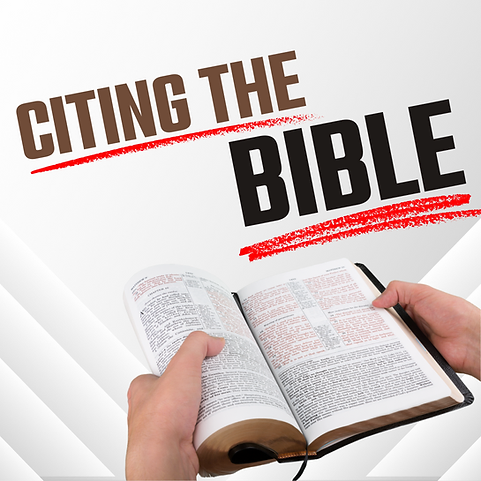Our Guide to Self-Editing Mastery has helped thousands of authors just like you:
- Pre-edit their books with ease
- Avoid the most common writing errors
- Quickly identify spelling & grammar mistakes
- Be more prepared for professional editing
Our Guide to Self-Editing Mastery has helped thousands of authors just like you:


So, you’d like to include some Scripture verses in your manuscript or blog post, but aren’t sure of the right way to format them—or even if there is a right way.
Let me assure you, there is a right way, according to the Chicago Manual of Style. CMOS sets the industry standard for proper grammar, syntax, and style found in most writing today: books, magazines, blog posts, etc.
I have some great tips and tricks on citing the Bible that I can't wait to share with you. Let's explore together!

Right from the start, there is one big thing to keep in mind any time you quote Scripture: keep track of which version or versions of the Bible you used for each verse quoted. As you probably know, there are many translations of the Bible, and each one words things slightly differently. It’s perfectly OK to use multiple versions of the Bible in your piece, but you need to make sure the reader knows which version of the Bible each quote came from.
Tracking the translations you use while you’re writing will potentially save you hours of work later.
While there is a set standard, you still have some different options available as to how you share that verse.
Here are a few examples of including a verse in writing, all using the same verse:
Example 1: Paul writes in his letter to the Philippians, “Rejoice in the Lord always: and again I say, Rejoice” (Phil 4:4, KJV).
Example 2: In Philippians 4:4 we read, “Rejoice in the Lord always: and again I say, Rejoice” (KJV).
Example 3: What does Paul say to us? “Rejoice in the Lord always: and again I say, Rejoice” (Phil 4:4, KJV).
In each example:
It is also up to you, the writer, to decide what format you prefer for the books of the Bible in your parenthetical references. Your intended audience may determine your choice. You could spell the entire book name, like Philippians, but it’s recommended to use an abbreviation like Phil.
If your quotation is from Kings, for example, you could also choose whether to use Roman numerals or cardinal numbers, II Kings or 2 Kings, though cardinal numbers are recommended.
Another option in your writing might be something like this: Paul reminds us in Philippians to always rejoice.
This is called an indirect quotation, since you are not quoting the Bible directly—rather, you are paraphrasing in your own words.
In this case, since there is no specific quotation, it can be left as is.
However, you may still want your readers to know where to find that verse. In that case, you could include a footnote at the end of the sentence, then provide the reference in your footnote.
Note that when indirectly quoting other things—research papers, for example—you have less leeway, and would need to add a proper citation for indirect quotations. For more help with citing non-Bible sources, check out our Citations Crash Course here!
If you are including a lengthy passage of scripture in your writing, you may want to quote it as a block text instead of including it in paragraph form. This is recommended if the quote is longer than three lines or so. Like the examples above, you may want to reference the passage within your text prior to inserting the block.
It might look something like this:
Paul shares the vastness of God’s love for us in Ephesians 2:4–10:
But God is so rich in mercy; he loved us so much that even though we were spiritually dead and doomed by our sins, he gave us back our lives again when he raised Christ from the dead—only by his undeserved favor have we ever been saved—and lifted us up from the grave into glory along with Christ, where we sit with him in the heavenly realms—all because of what Christ Jesus did. And now God can always point to us as examples of how very, very rich his kindness is, as shown in all he has done for us through Jesus Christ.
Because of his kindness, you have been saved through trusting Christ. And even trusting is not of yourselves; it too is a gift from God. Salvation is not a reward for the good we have done, so none of us can take any credit for it. It is God himself who has made us what we are and given us new lives from Christ Jesus; and long ages ago he planned that we should spend these lives in helping others. (NLT)
Or, the reference could be noted at the end like this:
Paul shares the vastness of God’s love for us.
But God is so rich in mercy; he loved us so much that even though we were spiritually dead and doomed by our sins, he gave us back our lives again when he raised Christ from the dead—only by his undeserved favor have we ever been saved—and lifted us up from the grave into glory along with Christ, where we sit with him in the heavenly realms—all because of what Christ Jesus did. And now God can always point to us as examples of how very, very rich his kindness is, as shown in all he has done for us through Jesus Christ.
Because of his kindness, you have been saved through trusting Christ. And even trusting is not of yourselves; it too is a gift from God. Salvation is not a reward for the good we have done, so none of us can take any credit for it. It is God himself who has made us what we are and given us new lives from Christ Jesus; and long ages ago he planned that we should spend these lives in helping others. (Eph 2:4–10, NLT)
Again, the reference and/or version is noted within parentheses, but this time there are no quotation marks, and the punctuation is at the end of the verse.
In a book, your citation for Scripture versions used will be included on your copyright page. If you only use one version of the Bible in your book, it would be stated there and the need to include the version with each verse quoted in the text would be unnecessary. If you use more than one version, then the most frequently used would not need the version noted in text, but all others would. Your copyright page notation would look something like this:
Unless otherwise indicated, all Scripture quotations are taken from the NEW AMERICAN STANDARD BIBLE, © 1960, 1962, 1963, 1968, 1971, 1972, 1973, 1975, 1977, by The Lockman Foundation. Used by permission. All rights reserved.
Scripture quotations marked (KJV) are taken from the King James Version of the Holy Bible. Copyright © 1972 by Thomas Nelson, Inc., Nashville, Tennessee.
Scripture quotations marked (MSG) are taken from The Message. Copyright © 1993, 1994, 1995, 1996, 2000, 2001, 2002. Used by permission of NavPress Publishing Group. All rights reserved.
I hope you’ve found this helpful, and it has cleared up some of the mystery for you regarding quoting Scripture verses.
~Tina

